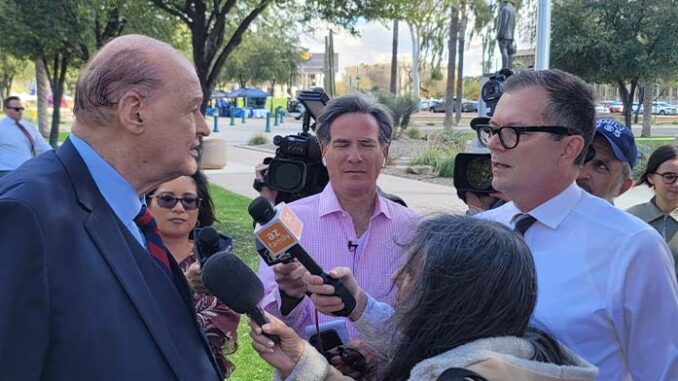
Brahm Resnik went after Tom Horne recently on his television show “Sunday Square Off.” Resnik and his two guests, journalist Chip Scutari and AZ Representative Analise Ortiz, discussed Arizona Superintendent Tom Horne’s lawsuit against Governor Katie Hobbs, Attorney General Kris Mayes, and the Creighton Elementary School District.
Superintendent Horne is holding Hobbs, Mayes, and Creighton Elementary officials responsible for disregarding an Arizona law, A.R.S. 15-756, that is based on a citizen’s initiative (Proposition 203) and that passed in 2000. This law requires schools to teach children identified as English learners through English immersion techniques rather than through bilingual education.
Dual language is a form of bilingual education. Thus, it is not allowed according to the law. Most often, native speakers of English are taught with Spanish-dominant English learners. The goal is for both groups to become fluent in the two languages represented. It sounds good but seldom works. In the Denver public school system, two dual language programs had to be closed down due to the low achievement of both groups of children. Arizona Department of Education data show that immersion techniques are generally about three times more effective for English learners than dual language instruction.
Whereas Representative Ortiz is approximately 30 years old, it is understandable she would not remember the English for the Children initiative (Proposition 203) that 63% of the voters passed in 2000. She made the claim that dual language is working to Resnik without presenting evidence – except that she had visited a classroom and liked what she saw. On the other hand, Resnik’s guest journalist Chip Scutari wrote about the issue extensively for the Arizona Republic back in the early 2000s. He did not present to Resnik what he knew to be the truth.
Contrary to Scutari’s claim, the Republican Party of Arizona did not support Proposition 203 in 2000 nor Tom Horne when he ran in 2002. The Republicans backed fully Horne’s opponent, Jaime Molera. Even Matt Salmon, the Republican candidate for governor in 2002, opposed Horne vehemently. As Scutari is well aware, the Republicans tended to look the other way when it came to the low achievement of English learners. However, the Arizona voters understood the problem so gave their support to Prop 203 and then to Tom Horne who was promising to finally implement that law!
The leaders of the Arizona English for the Children movement consisted of four individuals of Mexican origin who had grown up in Spanish-speaking homes. They considered themselves very fortunate to have learned English by being fully immersed in English at school. Three of them were educators familiar with the plight of English learners: Maria Mendoza, Hector Ayala, and Margaret Garcia Dugan. Norma Alvarez, a social worker, was the fourth leader. At least one of the four was a registered Democrat. Contrary to what Scutari stated on the Sunday show, Party affiliation had nothing to do with this cause. It was about children not learning English!
Norma Alvarez had gone to great pains to pull her son out of a bilingual program in a Phoenix school where he was learning very little. Interestingly, Alvarez got her way in that her son Jeff ended up being sent to the library to teach himself – which he did very effectively. Jeff became a medical doctor. When I interviewed him in 2003, he told me, “The students in bilingual ed could not speak English any better at the end of 8th grade than they could in the early grades.”
Most likely, Ortiz met or observed some English-dominant children speak in fluent Spanish in the dual language program she visited! I had the same experience at the Davis Magnet Bilingual School in Tucson – only to find out from the principal that not a single child was an English learner!
It is important to note that as soon as English learners become English proficient, they qualify for dual language and other mainstream programs. The trouble for the schools is that when this happens, the supplementary federal and state funds dry up that the schools have received for educating these children. Maybe that is actually what this is all about.
